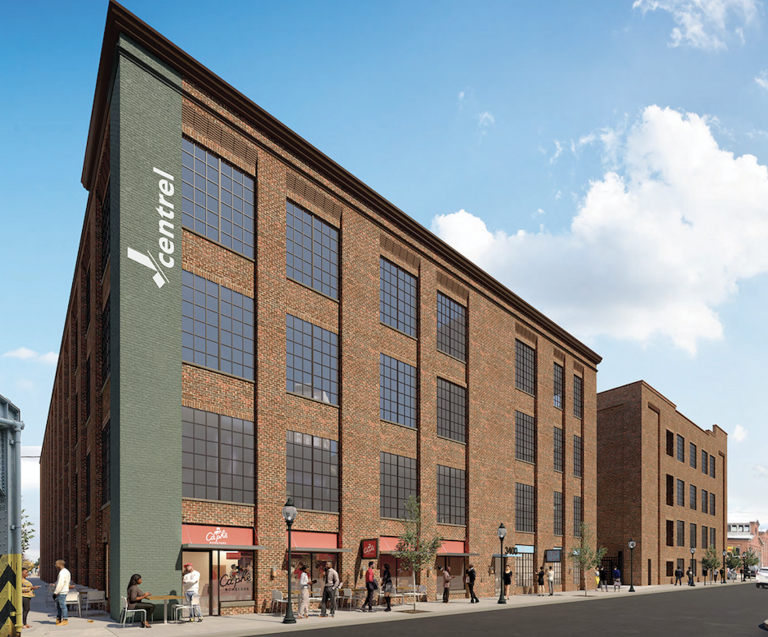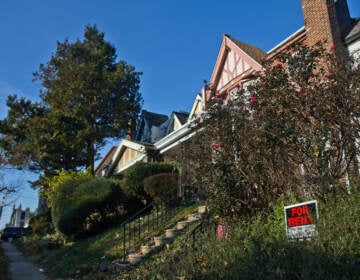Laundry, WiFi, and a doctor on call? Philly landlord experiments with telehealth
A social impact-minded landlord is offering telemedicine services to tenants in Philadelphia buildings.

Shift Capital is redeveloping this former textile mill on Kensington Avenue into affordable workspaces, residences, and retail space. Telehealth will be one amenity offered to renters. (Shift Capital)
In-unit laundry. Central air. Off-street parking. Fitness centers. When it comes to housing amenities, it’s a familiar list. In the urban rental sector, however, where landlords around the country are trying to accommodate their residents’ needs with bike repair facilities and produce banks, one Philadelphia property developer is testing out telehealth.
“The concept of landlords providing wraparound services for tenants, in particular, low-income tenants, is a no-brainer,” said Brian Murray, CEO of Shift Capital.
The social impact-minded landlord and developer owns approximately 100 affordable housing units in the Kensington area and now its renters will be eligible to tap into a new discount prescription and telemedicine service offered by a Washington D.C. startup called Health+.
At a rate of $10 per month per unit, Health+ comes at a minimal cost to Shift, Murray said, and could facilitate an “enormous” payoff by helping renters meet healthcare needs while maintaining their jobs — and their economic stability, thus reducing tenant turnover.
“Ideally, this really helps the mother who has the minimum-wage hourly job, and allows her an opportunity to not have to take the day off from work to take [her kids] to the doctor,” Murray said. “It doesn’t take dollars off her table, she doesn’t lose money off her paycheck. That could start a downward spiral.”
The way Health+ works is to create a bridge between Shift’s tenants and two other companies: Clever RX, a discount prescription drug card, and Teladoc Health, which connects patients 24 hours a day to one of 3,200 board-certified doctors through voice or video calls. Founded in 2002, Teladoc is available to 22 million Americans through their health and employee benefit plans, though its financial documents show more than 80 percent of them don’t use the service. It also has interpreters, so its network of physicians can communicate in up to 240 languages.
The amenity is one of several unconventional, socially-minded offerings Shift has rolled out as the certified B corporation works to deepen its footprint in Philadelphia. At its upcoming J-Centrel development, where Health+ will be available, residents can volunteer with neighborhood organizations to get rent discounts up to $100 a month. Both amenities are intended to help Shift accomplish its goal of strengthening the Kensington and Hunting Park communities where it has invested more than $60 million, according to Murray. In an op-ed published last year on Generocity, Murray wrote that Shift uses “practical real estate tools to lay the groundwork for sustainable communities, stronger cities and a better, more equitable society.”
James Plumb, a doctor and the co-director of the Jefferson Center for Urban Health, part of Thomas Jefferson University Hospitals, cautions landlords and tenants to think carefully about telehealth. He cautions that the service could create unintended negative consequences for patients if it doesn’t involve consulting the primary care physician or reviewing a patient’s medical history. “You try to maintain folks in a contained system so decisions can be made with background information on patients,” he said.
The a-ha moment
Shift, a certified B Corporation, is Health+’s first client in Philly and second overall behind McLean, Va.-based E&G Group, which rolled out Clever RX and Teledoc Health to 240 units in D.C. in September.
Matt Hoffman, a partner at Health+, spent more than a decade leading innovation for affordable housing nonprofit Enterprise Community Partners before the telehealth startup’s May 2019 launch.
“Health+ is taking proven market products to a new population,” Hoffman said. He described an a-ha moment when he realized telehealth could appeal to landlords for the same reasons it appeals to employers: It keeps employees on the clock. “It keeps them from wasting time driving to the doctor, sitting in a waiting room, getting a prescription,” he said.
Hoffman reiterated Murray’s business rationale for integrating Health+ as an affordable housing amenity, adding it is a better option for mission-driven landlords than having on-site health centers, which creates security and privacy challenges for the property owner.
“This is also a powerful marketing tool,” he said. “It is a signal to the current tenants and future tenants that this is a landlord that cares about me. … And that can increase lease renewals, it can decrease vacancy.”
Putting aside the hypothetical positives for property owners, Plumb said most major U.S. health systems, including Jefferson, have robust telehealth offerings – meaning Health+ is not necessarily filling any gap. “It might be redundant and in fact, it might be potentially harmful for continuity of care,” he said.
It is unclear how many of Shift’s and E&G’s renters, if any, signed up for Health+ due to limitations around healthcare data as well as the amenity’s recent introduction. Data is being collected, Hoffman said, and will likely be available early next year.
Meanwhile, Shift is also surveying its commercial tenants about the service, Murray said, to decide if it should roll out Health+ to those renters too. “We are trying to add another mental layer that can catch people when they fall.”
WHYY is your source for fact-based, in-depth journalism and information. As a nonprofit organization, we rely on financial support from readers like you. Please give today.






